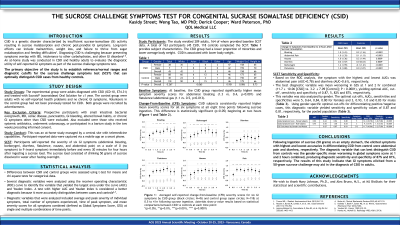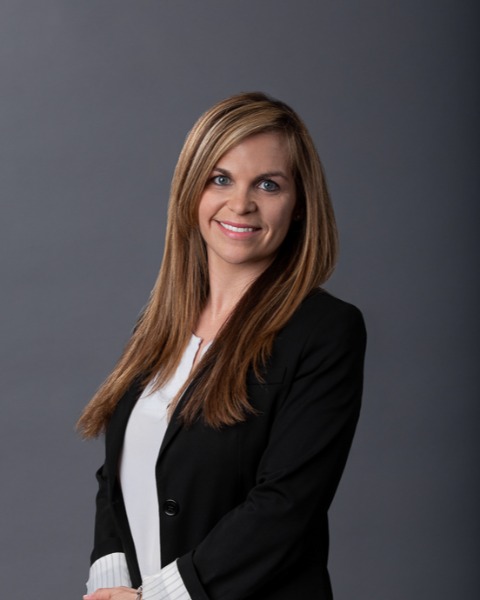Sunday Poster Session
Category: Functional Bowel Disease
P0526 - The Sucrose Challenge Symptoms Test for Congenital Sucrase Isomaltase Deficiency
Sunday, October 22, 2023
3:30 PM - 7:00 PM PT
Location: Exhibit Hall

Has Audio

Kasidy Street, BA
QOL Medical LLC
Vero Beach, FL
Presenting Author(s)
Kasidy Street, BA, Weng Tao, MD, PhD, Derick Cooper, BA, Ward Peterson, PhD
QOL Medical LLC, Vero Beach, FL
Introduction: A real-world sucrose-challenge study was conducted to evaluate the diagnostic utility of GI symptomatic responses evoked following ingestion of a sucrose load at home. The primary objective was to determine the symptoms-based diagnostic variables that can optimally distinguish CSID from healthy controls.
Methods: Study participants consisted of confirmed adult CSID subjects (n=45) and asymptomatic healthy controls (n=118). Immediately before and every 30 minutes for four hours after drinking sucrose (50 grams) dissolved in water, participants self-reported the severity of six GI symptoms (abdominal bloating, borborygmi, diarrhea, flatulence, nausea, and abdominal pain) using a 10-point Likert scoring system. Diagnostic variables used for statistical analysis included mean and peak changes in symptoms and the total number of symptoms associated with the SCST. Test accuracy and performance were assessed using the receiver operating characteristics curve to determine area-under-the-curve (AUC), sensitivity, and specificity for the diagnostic variable that optimally distinguishes CSID from controls.
Results: All six symptoms were significantly more severe in the CSID group between the 2 and 4 hr timepoints following sucrose ingestion. The diagnostic variable that best distinguishes CSID from controls is a global symptoms score (GSS) defined as the sum of worsening in severity scores across all 6 symptoms at 1 and 2 hours following sucrose ingestion. The GSS was 11.7 for CSID cases and 3.2 for healthy controls (P < 0.0001). The AUC, sensitivity, and specificity values based on the GSS are 0.85, 82% and 84%, respectively.
Discussion: Evoked symptoms in response to lactose, fructose, glucose and other sugar challenges are routinely used to aid in the diagnosis of carbohydrate malabsorption / intolerance. However, there are no published studies that evaluated the symptomatic responses to a sucrose challenge for diagnosing CSID. The results from the present study support the use of the SCST as a simple and non-invasive diagnostic tool that can be conducted without medical supervision to aid in the diagnosis of CSID.
Disclosures:
Kasidy Street, BA, Weng Tao, MD, PhD, Derick Cooper, BA, Ward Peterson, PhD. P0526 - The Sucrose Challenge Symptoms Test for Congenital Sucrase Isomaltase Deficiency, ACG 2023 Annual Scientific Meeting Abstracts. Vancouver, BC, Canada: American College of Gastroenterology.
QOL Medical LLC, Vero Beach, FL
Introduction: A real-world sucrose-challenge study was conducted to evaluate the diagnostic utility of GI symptomatic responses evoked following ingestion of a sucrose load at home. The primary objective was to determine the symptoms-based diagnostic variables that can optimally distinguish CSID from healthy controls.
Methods: Study participants consisted of confirmed adult CSID subjects (n=45) and asymptomatic healthy controls (n=118). Immediately before and every 30 minutes for four hours after drinking sucrose (50 grams) dissolved in water, participants self-reported the severity of six GI symptoms (abdominal bloating, borborygmi, diarrhea, flatulence, nausea, and abdominal pain) using a 10-point Likert scoring system. Diagnostic variables used for statistical analysis included mean and peak changes in symptoms and the total number of symptoms associated with the SCST. Test accuracy and performance were assessed using the receiver operating characteristics curve to determine area-under-the-curve (AUC), sensitivity, and specificity for the diagnostic variable that optimally distinguishes CSID from controls.
Results: All six symptoms were significantly more severe in the CSID group between the 2 and 4 hr timepoints following sucrose ingestion. The diagnostic variable that best distinguishes CSID from controls is a global symptoms score (GSS) defined as the sum of worsening in severity scores across all 6 symptoms at 1 and 2 hours following sucrose ingestion. The GSS was 11.7 for CSID cases and 3.2 for healthy controls (P < 0.0001). The AUC, sensitivity, and specificity values based on the GSS are 0.85, 82% and 84%, respectively.
Discussion: Evoked symptoms in response to lactose, fructose, glucose and other sugar challenges are routinely used to aid in the diagnosis of carbohydrate malabsorption / intolerance. However, there are no published studies that evaluated the symptomatic responses to a sucrose challenge for diagnosing CSID. The results from the present study support the use of the SCST as a simple and non-invasive diagnostic tool that can be conducted without medical supervision to aid in the diagnosis of CSID.
Disclosures:
Kasidy Street: QOL Medical LLC – Employee, Stock Options.
Weng Tao: QOL Medical LLC – Employee, Stock Options.
Derick Cooper: QOL Medical LLC – Employee, Owner/Ownership Interest, Stock-privately held company.
Ward Peterson: QOL Medical LLC – Consultant, Grant/Research Support, Stock Options.
Kasidy Street, BA, Weng Tao, MD, PhD, Derick Cooper, BA, Ward Peterson, PhD. P0526 - The Sucrose Challenge Symptoms Test for Congenital Sucrase Isomaltase Deficiency, ACG 2023 Annual Scientific Meeting Abstracts. Vancouver, BC, Canada: American College of Gastroenterology.

